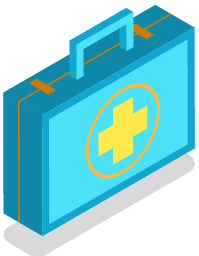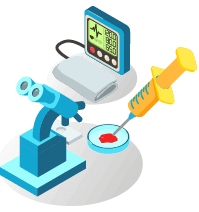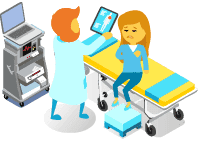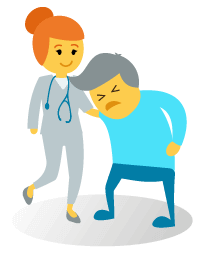Healthcare in France: Overview and Advice for Expats

Want to subscribe to a French energy offer?
Our English-speaking Selectra advisors are here to help you find the right energy plan.
(foreign IBANs accepted) at [email protected]. You can contact us also:

Whether you live in France or are planning to move there, getting familiar with the French healthcare is very important. The following guide provides information about how to get started with the French health system.
Getting started with the French health system and social security
Depending on your situation, the process you will have to complete to get in synch with the French healthcare system may vary.
How do I access the French Social Security?

Since 2016, the French law has replaced the CMU system by what is known as the PUMA (Protection Universelle Maladie). This new implementation guarantees the health cover of the active and inactive legal residents of France.
Once you arrive in France, you can access the French healthcare if you fit into one of the 4 following categories:
- An employee
- A business owner
- A resident of France
- An inactive person or retiree
Whichever of these categories you fall into, you will pay what is known as cotisations sociales, and these act as you contributions to the French healthcare system and allow you to get medical assistance in exchange (you may need to justify the fact that you pay these in order to apply).
If you have moved to France with your spouse or children, they may also be able to get access to healthcare, as long as the forms are filled in as required and that the application is confirmed.
Getting access to healthcare as an employee in France
If you relocate to France for work, the process will depend on your country of origin.
- If you are an EU citizen, you will usually be bound to a contract of maximum of 24 months. It will be up to your employer to sort out your social protection and to complete all the necessary steps. You may be able to your home country insurance during your stay in France, just contact your competent organisation to find this out.
- If you are a worker from outside the EU, as an expat you will be granted access to coverage of your health charges by the Assurance Maladie, for both you and, in most cases, for your family. Get in touch with your local CPAM (Caisse Primaire d’Assurance Maladie) for more information. Always check with your work how they can help and what you need to do on your side, as this process is not automatically set up.
Getting access to healthcare as a business owner in France
In order to get access to healthcare as a business owner or an entrepreneur (as a sole trader or a SARL business owner), you need to complete the process via the URSSAF and/or the RSI. A letter from these organisations will notify you that your affiliation has been taken into account, and you will then need to provide a list of documents to prove your status and make your coverage effective.
While you wait for your file to be validated, you will get a temporary social security number, which will allow you to use the French health system in the meantime. Your carte vitale will be processed by your mutuelle you have chosen, and should be issued within the next weeks. If not, make sure to follow up.
Getting access to healthcare as a resident of France

In this situation, you can get access to healthcare if you can prove you have been in France for over 3 months. Apply via the PUMA at your local CPAM, and don’t forget to prepare the following documents:
- Proof of residence in France for more than 3 months
- Passport
- Birth certificate & legal translation
- CERFA form
- Bank details (RIB)
- Your declaration of ‘medecin traitant’
Getting healthcare as a retiree or an inactive person in France
If this is your situation, you can get access to healthcare too. Simply ask for the S1 issued from your home country, and then complete the Cerfa 60-3406 Declaration, if you are a pensioner. Some documents will be requested, such your proof of pension, passport, birth certificate... Note that the whole process, from getting affiliation to receiving your carte vitale may take up to 2 months.
Social security registration for international students
If you are moving to France to study, you need to register to on the dedicate healthcare for international students website. The process needs to be started before your move, and implies you to submit a list of supporting documents. After your case is approved, you will be given you social security number and will be asked to create your online ameli account, through which you can also apply for your carte vitale. Find out more for about the process on the ameli website (in English)
What if I'm only moving to France temporarily?
Any person moving to France for under 3 months does not need to join the French health insurance fund.
EU citizens benefit from a system of coordination set up between EU countries to better regulate the Health Insurance, and are therefore protected by their country's insurance during their travels in France. Just note that if you are indeed a European traveling to France, you have to obtain a European Health Insurance Card (EHIC) from your local health insurance organization before your trip. Each member of your family needs their own card.
As for people coming from outside the EU, they must obtain a visa called "Schengen visa" to come to France, whether for personal or professional reasons. To obtain it, you must subscribe to an insurance that will cover you for the duration of your stay in France and in the case of illness, accident or hospitalization. The insurance, known as "Schengen insurance" is offered by all insurance companies, and allows for a maximum of €30,000 in medical costs, as well as repatriation and civil liability guarantees.
How health insurance works in France
As an expat or international student, you may want to become familiar with how the insurance system works for France, and how to use your EHIC if this applies to you.
The French Insurance system
In France, the healthcare system is funded by 2 insurance schemes:
- The Assurance Maladie, a State owned health insurance social security system
- The Assurance Complémentaire, to which you can choose to subscribe to through a private insurer or mutuelle.
Even though the first component covers the majority of your medical costs, the second component will help you cover the remainder.
Using an EHIC (European Health Insurance Card)
The EHIC, or CEAM in French (Carte Européenne d'Assurance Maladie) is designed to enable an EU citizen to get access to medical care in any EU country, Norway, Liechtenstein, Iceland or Switzerland. It is free and personal to you, meaning each member of your family must have their own. The EHIC validity varies from one country of issuance, between 1 and 10 years (2 years in France).
The card will allow you to get state-provided treatment for any routine check, as well as illnesses, chronic diseases or maternity care. This won't work, however, if you visit France with the sole intention of getting medical treatment, and the EHIC does not necessarily entitle you to a refund of the total cost of the consultation. All reimbursements you receive via the EHIC will be based on the official tariff list (tarifs conventionnés) set by the French Authorities.
It is important to note that some practitioners are "non conventionnés", meaning they charge more than the regular rates, meaning that if you pay a higher, non-conventionné price for a consultation, you will be liable to pay the gap between the total cost and the amount of a conventional tariff.
You should order yours from your home country before moving to France (an EHIC delivered by France will not be usable in France).
Going to the doctor's in France

Upon arriving in France, you will have to choose at doctor who will be your “reference doctor”, know as your médecin traitant. You will want to ask him to make this official by filling out a Déclaration de Médecin Traitant, a very important document which will then allow you to complete your health care access form. This doctor will be able to refer you to another health professional if needed (except for gynaecologists or dentists, for whom you don’t need a referral).
How to get an appointment with a GP in France
Here are a few ways to get an appointment with a medical professional in France:
- Over the phone, by directly getting in touch with the doctor's office
- By going into the practitioner's office and arranging a date in face to face
- Online, via the website of the hospital or office in which the doctor works
- Via and app or website such as DoctoLib, an easy online platform that allows you to quickly and simply find a doctor near you and select an appointment date
Don't hesitate to ask for advice around you on which doctor to sign up with: your neighbours, colleagues or fellow students will be able to advise you on the practitioners they recommend.
Just make sure your doctor is "conventionné", meaning they work within the French health system and apply the nationally regulated tariffs, this way you will avoid paying excessive an price and will be able to get the proper refund for your appointment.
How much will a consultation with a French doctor will cost?
Below is a summary of the main tariffs for medical consultations in France. You can usually pay your consultation with cash, by cheque, or occasionally with a carte bancaire (debit card).
| Type of consultation | Tariff |
|---|---|
| For a conventionné doctor consultation | €25 |
| For a non-conventionné, but capped doctor consultation | €30 |
| For a consultation with a referred specialist | €30 |
| For a complex consultation with a specialist (associated to diseases such as diabetes, MS, epilepsy, Parkinson's... | €46 |
| For a highly complex consultation with a specialist (associated to diseases such as cancer, HIV, a premature birth...) | €60 |
| For a dentist appointment | €23 |
| For a dentist appointment - tooth decay treatment | between €19.28 and €40.97 depending on the decay severity |
| For a dentist appointment - tooth extraction | €16.72 (milk tooth) / €33.44 (permanent tooth) |

Once you pay for the consultation, the refund process depends on whether you have a carte vitale yet or not.
If you have your card, present it to the doctor, and this will allow to electronically notify your insurance organisation of the payment, and you should receive your refund automatically within the next 7 days.
If you don't yet have a carte vitale (but have a social security number), the GP should issue you what is known as a "feuille de soins", which is a paper invoice that replaces the carte vitale, that you then need to fill out and send on to your local CPAM. You should address the feuille de soins to the organism no later that 3 months after it is issued in order to get reimbursed.
How much will I be refunded for medical treatment in France?
You will usually be able to get a 70% refund for your doctor and dentist consultations, and between 35% to 100% of a refund for the medicines you were prescribed, depending on how costly and vital they are. Make sure you keep all your receipts just in case.
If however you go to see a specialist without following the standard process of parcours de soins, meaning you go and see a specialist without prior referral from your médecin traitant, your refund will be decreased from 70% down to 30% (except for consultations with an ophthalmologist or gynaecologist, which will be always kept at the 70% refund rate).
What about hospital treatment costs?
If you ever need to be hospitalised while you live in France, the French medical insurance system might take care of 80% of the costs, and you can get the other 20% covered by your personal insurance. The clinic or hospital will give you a specific invoice that you will have to send off to your local CPAM (Caisse Primaire d'Assurance Maladie) in order to receive your refund.
However, you will be in charge of paying the forfait hospitalier, which corresponds to the cost of your accommodation and maintenance while you are in the facility. This cost is set to €20 per day, including your leaving day. There are some exonerations to this though, including for pregnancies, hospitalised newborns, handicapped children under 20 years old, victims of terrorism...
Useful phrases when at the doctor's
Here are a few medical French terms translated, that can come in use when planning your appointment.
| English term | French translation |
|---|---|
| I feel sick | Je ne me sens pas bien |
| My stomach hurts | J'ai mal au ventre |
| My head hurts | J'ai mal à la tête |
| I have a sore throat | J'ai mal à la gorge |
| I feel dizzy | J'ai la tête qui tourne |
| I've been sick | J'ai vomi |
| I have diarrhoea | J'ai la diarhée |
| I'm allergic to | Je suis allergique à / au |
| I have the flu | J'ai la grippe |
| A prescription | Une ordonnance |
| A medication / tablet | Un médicament / cachet |
| Diabetes | Le diabète |
| High blood pressure | Hypertension |
| Pain | La douleur |
| Migraines | La migraine |
| An injection | Une piqûre |
| A vaccine | Un vaccin |
| An X-ray | Une radio |
Important medical emergency numbers

Here is a list of the French emergency phone numbers you will want to contact if you or a person around you encounters a health issue in the country. These numbers are free to call and can be joined from a fixed line, cellphone and payphone alike, unless stated otherwise.
| For an ambulance (the SAMU) | 15 |
|---|---|
| For the police | 17 |
| For the fire brigade | 18 |
| European emergencies (from a mobile phone) | 112 |
| Emergencies for deaf people | 114 |